|
|
|
Sort Order |
|
|
|
Items / Page
|
|
|
|
|
|
|
| Srl | Item |
| 1 |
ID:
136939


|
|
|
|
|
| Summary/Abstract |
Europe is a profoundly flexible concept and, in Ernesto Laclau’s terms, a ‘floating signifier’ which is given various meanings depending on the speaker’s political aims. The article focuses on current populist and nationalist political discourses in Finland and the articulation of Europe and European identity in the political rhetoric of The Finns Party. In the rhetoric, Europe is given contradictory meanings. On the one hand, it is perceived as a cultural and value-based community which shares a common (Christian) heritage and values. Identification with Europe and the promotion of European communality are particularly pronounced when a threat towards ‘us’ is experienced as coming from outside the imagined European borders. On the other hand, the European integration process and Europe as a political project can be articulated as threats not only to national independence, identity and cultural particularity but to European cultural identity as well.
|
|
|
|
|
|
|
|
|
|
|
|
|
|
|
|
| 2 |
ID:
136858


|
|
|
|
|
| Summary/Abstract |
In the shadow of one of Europe’s most sustained terrorist problems, Greece is entering a new era of radical left-wing politics. George Kassimeris explore the threat facing the country’s counter-terrorism agencies from the next generation of militant anarchists.
|
|
|
|
|
|
|
|
|
|
|
|
|
|
|
|
| 3 |
ID:
134961


|
|
|
|
|
| Summary/Abstract |
This special issue of the Asia Europe Journal focuses on a triangulated conversation between scholars working in/on Asia, Europe and Australia. The essays showcase the work of early career researchers involved in the EU-Oceania Social Science Inter-regional Consortium (EUOSSIC) Erasmus Mundus exchange programme that links leading universities in Europe1 with those in Australia2 and New Zealand3 to promote the study of European Union (EU) external relationships. Erasmus Mundus was launched in 2004 and is funded by the Education and Culture Directorate General of the European Commission with the objectives of enhancing the quality of European higher education and the promotion of dialogue and understanding between people and cultures through cooperation with third countries. The aim of the EUOSSIC Erasmus Mundus exchange programme (2011–2013) is to build on existing connections to create a formal programme of inter-regional exchanges between the EU and Oceania for doctoral and post-doctoral scholars as well as academic staff with a Social Science background. In total, 61 doctoral students, 11 post-doctoral fellows and 27 academic staff were involved in the EUOSSIC Erasmus Mundus programme.
|
|
|
|
|
|
|
|
|
|
|
|
|
|
|
|
| 4 |
ID:
135874


|
|
|
|
|
| Summary/Abstract |
The article looks at structural analogies between the strategic situation in Europe in the summer of 1914 and in East Asia today, with particular emphasis on the probability of the outbreak of a major war. The author examines analogies regarding the nature of the international system, i.e. is the international system characterized by outright anarchy or by a more or less developed and institutionalized understanding among the main actors about the way to preserve peace and to organize economic exchange? The article addresses domestic factors (nationalism, democratic, authoritarian or semi-democratic regimes) and investigates military dynamics against the backdrop of geography and the availability of military equipment and technologies. Possible routes of military escalation are also discussed. Special attention is paid to states that have isolated themselves and that dispose of military means that might promise swift victory. The article comes to the conclusion that there are very few similarities between Europe in 1914 and East Asia today, but that both the high degree of militarization of the Korean peninsula and the evolving military competition between the US and China in the region do imply the possibility of a major armed conflict in a not too distant future
|
|
|
|
|
|
|
|
|
|
|
|
|
|
|
|
| 5 |
ID:
136471
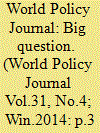

|
|
|
|
|
| Summary/Abstract |
Europe is in the throes of a crisis of identity springing from deep economic distress in many of its member states and political divisions both within and without. World Policy Journal asked a European panel of experts—from France to Bulgaria to Sweden—how this crisis is affecting their corner of the continent and what their countries need to remain viable.
|
|
|
|
|
|
|
|
|
|
|
|
|
|
|
|
| 6 |
ID:
136020


|
|
|
|
|
| Summary/Abstract |
Europe’s attempts to expand its sources of natural gas have been hampered by a series of geopolitical challenges, Georgiy Voloshin and Andrew Neff examine whether the planned southern gas corridor will reduce Europe’s reliance on Russia supplies.
|
|
|
|
|
|
|
|
|
|
|
|
|
|
|
|
| 7 |
ID:
134475


|
|
|
|
|
| Summary/Abstract |
In recent years, the European Union has supported the development of a new civil security market, capable of providing security technology for new and global security challenges. This article analyses the emerging growth market for civil security in relation to contemporary notions of potential crisis and emergency. Building on ongoing academic analysis of what Melinda Cooper has termed ‘economies of emergence’, the article points out how the figure of emergence generates investment in more flexible, adaptive and, so it is argued, potentially lucrative markets for civil security. Drawing on observations at a number of security trade shows and stakeholder workshops, the analysis demonstrates that ‘civil’ aspirations, concepts and technologies build on earlier formulations of military strategic discourse in the so-called Revolution in Military Affairs – though in complex and sometimes contradictory ways. More generally, the motivation behind the analysis is to investigate civil security and civil markets as performative enactments, and so to critically engage with the emergence of the civil security market as a priority in EU policymaking.
|
|
|
|
|
|
|
|
|
|
|
|
|
|
|
|
| 8 |
ID:
134546
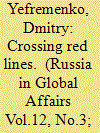

|
|
|
|
|
| Summary/Abstract |
The Ukrainian crisis is just ushering in a series of conflicts amid which a polycentric system of international relations will form. An effective multilateral mechanism must be created for preventing and settling crises in Europe and North Eurasia.
|
|
|
|
|
|
|
|
|
|
|
|
|
|
|
|
| 9 |
ID:
134508


|
|
|
|
|
| Summary/Abstract |
The Euro-Arab Dialogue (EAD) was established by the European Economic Community in 1974 as a way of improving bilateral relations between Europe and the Arab world in the wake of the October 1973 Arab-Israeli War and the subsequent global energy crisis. This article examines the success of the EAD in its first three years in existence (between 1974 and 1977). It begins with an analysis of the literature on the framework in these years. Much of this material argues that the EAD was a success in achieving its goal of improving relations with the Arab world as well as evidence of the success of the recently established European Political Cooperation (EPC) framework in general. This article challenges this view and instead argues that the EAD, even in its early years, was not a success due to three factors: the first was the failure of the EEC to keep the EAD focused on economic issues and to prevent the politicization of the framework; the second was the Community's inability to come to grips with the deep internal divisions over both the mandate and goals of the EAD; and the third was American hostility towards the EAD from the time of its birth.
|
|
|
|
|
|
|
|
|
|
|
|
|
|
|
|
| 10 |
ID:
135135
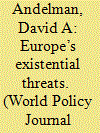

|
|
|
|
|
| Summary/Abstract |
On Saturday, October 1, 1977, I arrived in Belgrade to take up my post as East European bureau chief of The New York Times. I’d timed my arrival to coincide with the opening of the conference of the Commission on Security and Cooperation in Europe (CSCE), one of many efforts during the depths of the Cold War to facilitate dialogue between East and West—the two halves of a very much divided, and at times hostile, Europe.
|
|
|
|
|
|
|
|
|
|
|
|
|
|
|
|
| 11 |
ID:
135873


|
|
|
|
|
| Summary/Abstract |
A truly democratic European Union seems to have become the graal of European politics, the project's redemptive promise and unreachable horizon. Much has been written about the gap between promise and performance and about the obstacles to EU democratization. Here, we suggest that one way to apprehend the ‘democratic deficit’ debate as it has evolved in the wake of the euro crisis is to think of it as a ‘democratic trilemma’. We argue that European legitimacy requires responses in different realms: first, an acknowledgement of Europe's ‘transnational democratic interdependence’; second, an anchoring of the functionalist European superstructure in ‘national democratic legitimacy’; and third, a grounding of both European and national power in ‘local democratic legitimacy’. While the very notion of trilemma points to the tensions that arise in trying to satisfy these requisites simultaneously, we nevertheless need to look for ways of alleviating the trilemma rather than coming up with democratic magic bullets in a single one of these realms. While our main goal is to reframe and open up the debate around the key concepts of empowerment, mutual recognition and flexibility, we also provide examples of what this may mean.
|
|
|
|
|
|
|
|
|
|
|
|
|
|
|
|
| 12 |
ID:
135227


|
|
|
|
|
| Summary/Abstract |
Although the prestige of European civilization suffered a body blow in World War I, it took most Europeans longer to realize that their continent was not the center of the world, and longer still to think of a war fought mainly in Europe as a truly global conflict.”
|
|
|
|
|
|
|
|
|
|
|
|
|
|
|
|
| 13 |
ID:
136105


|
|
|
|
|
| Summary/Abstract |
In January 2012, the US administration released new strategic guidance for the Department of Defense entitled ‘Sustaining US Global Leadership: Priorities for 21st Century Defense’. Two different security approaches seem to coincide in this document. By providing a governmental reading of the new strategic guidance, the aim of this article is to discuss if and how the guidance links a sovereign security understanding of great power politics on one side to governmental rationalities on the other. First, the guidance is discussed with regard to its main aims and strategies; then, second, the impact of governmentality in the guidance is revealed and systematized. Finally, the function that governmental logics have in the document, and the conceptual and political role that the minimally mediated encounter of sovereign (military) power politics with governmental rationalities plays, are considered.
|
|
|
|
|
|
|
|
|
|
|
|
|
|
|
|
| 14 |
ID:
136486
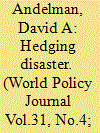

|
|
|
|
|
| Summary/Abstract |
Even though the current economic crisis threatens all corners of the globe, Europe has proven particularly vulnerable. The transformation and scaling of the continent have failed to keep pace with the external forces preying on its weaknesses. World Policy Journal editor & publisher David A. Andelman examines the extent of the European crisis, its echoes abroad, and the challenges it must surmount to survive.
|
|
|
|
|
|
|
|
|
|
|
|
|
|
|
|
| 15 |
ID:
134541
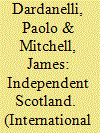

|
|
|
|
|
| Summary/Abstract |
The September 2014 referendum is a milestone in Scotland’s history. After 307 years of union with England and a 15-year experience with devolution, Scottish nationalism is within reach of its ultimate goal. Independence would be consensual and Scotland and the rest of the UK would retain multiple links. The EU dimension looms large in the debate and is entangled with the UK’s own review of its membership. Scotland’s referendum is part of a wider trend seeing other ‘stateless nations’ in the democratic world pursuing independence. Even if opinion polls indicate voters will likely reject secession, Scotland’s experience holds important lessons for the wider world.
|
|
|
|
|
|
|
|
|
|
|
|
|
|
|
|
| 16 |
ID:
136826


|
|
|
|
|
| Summary/Abstract |
Iran has often come forward to become an energy provider both for the Mediterranean (Turkey, Greece and Europe now dealing with new gas routes scenario) and for the Eastern Asian countries like Pakistan and India or Kazakhstan with which Iran is starting a cooperation on petrochemicals, oil and gas. Although its geographic position allows Iran to think big, conquering the Western countries' trust won't be easy. Let's consider for example the reduction of oil exportations in the first few months of 2014 following restrictions linked to the agreement on the easing of sanctions.
|
|
|
|
|
|
|
|
|
|
|
|
|
|
|
|
| 17 |
ID:
136529


|
|
|
|
|
| Summary/Abstract |
International science cooperation networks are increasingly contributing to improving relationships among countries and to the integration of world regions.1 Latin American countries have a long tradition of bilateral, regional, and global scientific cooperation as an essential tool to strengthen and complement national capacities for research, technological development, and innovation.2 However, despite numerous multilateral initiatives, the region has not fully leveraged the opportunities and additional benefits that scientific collaboration offers to facilitate international relations, address shared transnational challenges, and achieve common development goals. The multiplicity of forums at the political level, budgetary problems, political instability, and the gap between science and policy have limited the effectiveness and relevance of multilateral scientific initiatives on broader political and societal decisions.3 The accelerated growth of Latin America in the last decade represents an opportunity to build scientific and technological capacity while contributing to strengthening the relationships among its countries in the twenty-first century.
|
|
|
|
|
|
|
|
|
|
|
|
|
|
|
|
| 18 |
ID:
135963


|
|
|
|
|
| Summary/Abstract |
Parties in pluralist democracies face numerous contentious issues, but most models of electoral competition assume a simple, often one-dimensional structure. We develop a new, inherently multidimensional model of party strategy in which parties compete by emphasizing policy issues. Issue emphasis is informed by two distinct goals: mobilizing the party's core voters and broadening the support base. Accommodating these goals dissolves the position-valence dichotomy through a focus on policies that unite the party internally while also attracting support from the electorate at large. We define issue yield as the capacity of an issue to reconcile these criteria, and then operationalize it as a simple index. Results of multilevel regressions combining population survey data and party manifesto scores from the 2009 European Election Study demonstrate that issue yield governs party strategy across different political contexts.
|
|
|
|
|
|
|
|
|
|
|
|
|
|
|
|
| 19 |
ID:
134268


|
|
|
|
|
| Summary/Abstract |
Europe is facing both a political crisis of democracy and legitimacy and an economic crisis of debt and competitiveness. These crises seem to point in two distinct directions, growing social unrest over the Europeanized mechanisms of economic adjustment, and increasing efforts at strengthening those same institutions that regulate the adjustment process. Recent analyses have suggested that this failure of democracy will prove decisive; legitimacy for crisis management efforts requires a redemocratization of the European polity. Instead, drawing on an analysis of ordo- and neo-liberal traditions, the article explains how European integration was itself a response to the perceived threat of democratic demands at the domestic level. The body of the article then traces the crisis through three phases, arguing that efforts by state managers reflect a deliberate attempt to depoliticize policy-making processes. Yet the selective intervention—to restore accumulation whilst withdrawing social spending—has only fuelled the politicization of segments of European society. This threatens to test the limits of depoliticization as a governing strategy.
|
|
|
|
|
|
|
|
|
|
|
|
|
|
|
|
| 20 |
ID:
134472
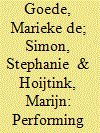

|
|
|
|
|
| Summary/Abstract |
Nearly 15 years after 9/11, it is time to grapple with the way in which imperatives of preemption have made their way into routine security practice and bureaucratic operations. As a growing literature in security studies and political geography has argued, preparing for catastrophe, expecting the worst, and scripting disasters are central elements of contemporary, speculative security culture. One of the most-discussed findings of the 9/11 Commission Report was that US security services had insufficiently deployed their imagination to foresee and preempt the attacks. This article introduces a special issue that offers a range of in-depth empirical studies that analyse how the imperative of ‘routinizing the imagination’ plays out in practice across different policy domains. It deploys the lens of performativity in order to conceptualize and explain the materialization of preemption and its situated entanglements with pre-existing security bureaucracies. We detail the idealized traits of a ‘security of the interstice’, which include interoperability, emergence, flexibility and analytical foresight that are meant to bridge the perceived gaps of security spaces and the temporal bridges between present and possible futures. The lofty rhetoric of preparing for the worst and bridging the gaps encounters numerous obstacles, challenges and reversals in practice. As becomes clear through the notion of performativity, such obstacles and challenges do not just ‘stand in the way’ of implementation, but actively shape the materialization of preemption in different sectors.
|
|
|
|
|
|
|
|
|
|
|
|
|
|
|
|
|
|
|
|
|